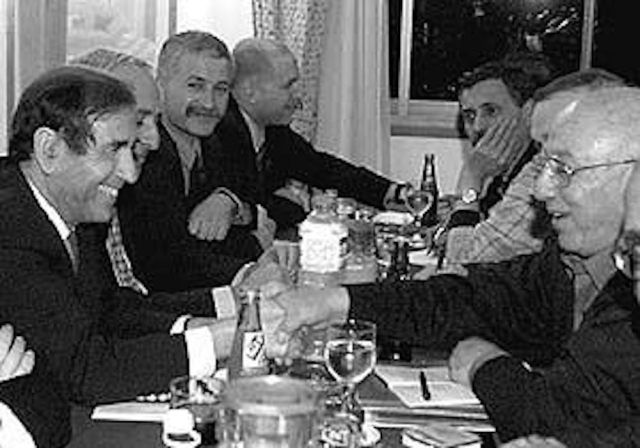On January 27th, 2001, one of the last prominent negotiations between Israel and Palestinian officials concluded in what would be called the Taba Summit in Egypt. The talks took place just as President Bill Clinton transferred his duties to George W. Bush and Israeli Prime Minister Ehud Barak was facing a challenging election campaign from to-be PM Ariel Sharon.
It should be noted that the talks are a symbol of just how desperate Israeli officials were in achieving some sort of peace agreement with the Palestinians, amid the developing Second Intifada. In the 26 days of January prior to the concluding day of the Taba Summit, Palestinian terrorists had killed 8 Israelis and injured over 60, in multiple shooting attacks and one suicide bomb attack on an Israeli bus. While the Israeli public was slowly growing tired of the ongoing Palestinian violence, the Taba Summit was the last beacon of hope for a diplomatic solution to the conflict.
The first, the Camp David Accords of July 2000, and later – six weeks after Barak’s resignation as PM, the Taba Summit of January 2001 (attended by Israeli Foreign Minister, Shlomo Ben-Ami)
— On This Day in Jewish History (@dailyjewish) December 10, 2021
The summit was based on the backbone for peace, according to President Clinton in his final weeks in office. They focused on four major clauses, the refugee status, security for Israeli sovereignty, Palestinian Authority borders, and the status of Jerusalem, specifically it's eastern half. From American accounts the Israelis had gone further than anyone expected in their willingness to offer concessions, however, the Palestinians kept increasing their ask as the offers were made.
The talks were considered somewhat successful, yet the fact that ongoing terrorism was being used by Palestinian activists while it was taking place, made it extremely hard for the Israeli public to buy what the Palestinian Authority was trying to sell on the diplomatic level. Ultimately, both sides agreed that significant progress towards a final agreement and a two-state solution was near.
3/4 To blame Jewish communities in Judea/Samaria for lack of peace misreads history. The Arabs have rejected:
— Danny Danon 🇮🇱 דני דנון (@dannydanon) April 29, 2019
1937 Peel Commission Report
1947 UN Partition Plan
1948 Israel truce
2000 Camp David Summit
2001 Taba Summit
2007 Annapolis Conference#UNSC
A joint statement on a concluding day said: “The Taba Talks conclude an extensive phase in the Israeli-Palestinian permanent status negotiations with the sense of having succeeded in rebuilding trust between the sides and with the notion that they were never closer in reaching an agreement between them than today. We leave Taba in a spirit of hope and mutual achievement acknowledging that the foundations have been laid both in reestablishing mutual confidence and having progressed in a substantive engagement on all core issues.”
As mentioned in the latter, the Israeli public who had suffered from terrorism greatly in January 2001, remained convinced that the Palestinian Authority has no real intention of putting their guns down and on February 6, 2001, traditionally right-wing Ariel Sharon defeated Ehud Barak in a landslide election for Prime Minister.
Nonetheless, a final failed attempt at a diplomatic solution with the Palestinians was made through Sharon’s controversial ‘land-for-peace’ initiative in 2005 with the evacuation of the Gaza Strip; Hamas would quickly take control and use the Strip as a hub for terrorist activities against Israeli citizens.


